Thesis
The web browser has become the primary interface for modern work. As of 2025, nearly all of the world’s ~5.5 billion internet users access the web through a browser, with Google Chrome alone accounting for over 3.6 billion users. In the enterprise, workers spend over 70% of their time in the browser or in virtual meetings as of April 2023.
Traditional browsers, however, were originally built for consumers, not enterprise-grade productivity or security. As browser use has grown, so too have browser-based threats. In 2025, phishing attacks targeting browsers rose 140% compared to 2023, largely driven by a surge in threats powered by generative AI. Such exploits can enable attackers to execute code remotely, steal data, and gain broader access across corporate networks.
Solutions like Virtual Desktop Infrastructure (VDI) and Remote Browser Isolation (RBI) are often considered impractical. VDI, which provides access to a remote desktop from any device, can be expensive and complex to maintain, especially for cloud-native companies built around web-based workflows. RBI, which renders web content on a remote server, can degrade performance, increase bandwidth costs, and create a poor user experience for interactive tasks.
The shift to hybrid work during the COVID-19 pandemic, along with the growing use of bring-your-own-device (BYOD) policies and reliance on short-term or external contractors, has further driven demand for secure, flexible browser access across devices and locations. At the same time, the widespread adoption of SaaS tools has pushed core business functions away from local desktop software and into the browser. The 2009 release of Chromium’s open-source code gave developers a foundation to build secure, enterprise-specific browsers faster by modifying the existing Chrome architecture instead of starting from scratch.
Island, the “enterprise browser,” was founded in response to these shifts. Built on the Chromium open-source project, the Island Enterprise Browser gives companies the ability to manage and secure user activity within web applications. Unlike traditional browsers, Island includes native controls for access, data movement, and user behavior, which enables IT and security teams to enforce policies, monitor activity, and respond in real time based on user, device, and app context. Island’s stated mission is to build “a single space, where everything organizations need to work safely and productively is built in”.
Founding Story

Source: Globes
Island was founded in August 2020 by Mike Fey (Co-Founder & CEO) and Dan Amiga (Co-Founder & CTO).
Before co-founding Island, Fey served as CEO of D2iQ (formerly Mesosphere), where he led the company’s transition towards enterprise-grade application management across both private data centers and public cloud platforms. Prior to that, he held senior leadership roles at two major cybersecurity firms, Symantec (now Gen Digital) and Blue Coat Systems, serving as President and COO at both. Fey played a pivotal role in orchestrating Blue Coat Systems’ $4.7 billion acquisition by Symantec. Earlier in his career, he was Executive Vice President and General Manager of enterprise products at McAfee, and later served as Chief Technology Officer of Intel Security following Intel’s acquisition of McAfee, where he helped to define product strategy across network, endpoint, and analytics security. Fey earned his degree in Engineering Physics and Mathematics from Embry-Riddle Aeronautical University and is the co-author of Security Battleground: An Executive Field Manual. After departing Symantec in 2018, he stepped away from the industry with plans to enter private equity.
Prior to Island, Amiga invented web isolation technology as the founder and CTO of Fireglass, one of the earliest companies to pioneer and commercialize RBI. He previously led software security initiatives at Microsoft’s Technology Center in Tel Aviv and served as Chief Software Architect at Schneider Electric, where he developed integrated tech solutions for industrial systems. Amiga also spent five years in Israel’s cyber intelligence unit, Unit 8200. He was an early investor in several cybersecurity startups, including Axis Security, Cycode, and Build. Security. He teaches advanced cloud computing as an adjunct professor at Reichman University (formerly IDC Herzliya).
Fey and Amiga first met while collaborating on Symantec’s 2017 acquisition of Fireglass, Amiga’s previous startup, for a reported $250 million. Their shared conviction that the browser could become the new enterprise control plane led them to co-found Island and enter stealth in August 2020. Amiga brought the technical vision, seeing an opportunity to improve on RBI by building security directly into a browser. Fey recognized the commercial potential of rethinking the browser. The company emerged out of stealth mode in February 2022. Island is headquartered in Dallas, with operations across North America and Europe, and an R&D center in Israel, where Amiga resides. Fey, based in Dallas, has spoken about the strategic benefits of scaling a startup outside the constraints of saturated tech hubs.

Source: Island
Island attracted a leadership team with extensive cybersecurity and enterprise experience. Founding executive Brian Kenyon, who served as Chief Strategy Officer until his passing in February 2024, played a central role in shaping Island’s early product and go-to-market strategy, drawing on prior leadership at Blue Coat Systems and Foundstone. Ellen Roeckl, appointed as the company’s first Chief Marketing Officer in 2022, helped define Island’s brand during its public launch and was later promoted to Chief Communications Officer before retiring in 2024. She was succeeded by Matt Fairbanks, former CMO of Sophos, in mid-2025. Daniel Kandel, who joined Island in its founding year, leads R&D after holding senior engineering roles at Symantec and Explorium. Jennifer Park, brought on as Island’s first Chief People Officer in 2022, leads efforts around culture and recruitment, drawing from her HR leadership at Google, American Express, and D2iQ. Island also benefits from strategic guidance by advisors such as Joe Sexton (former AppDynamics President), cybersecurity veterans Mickey Boodaei and Rakesh Loonkar, and members of the Silicon Valley CISO Investments group.
Product
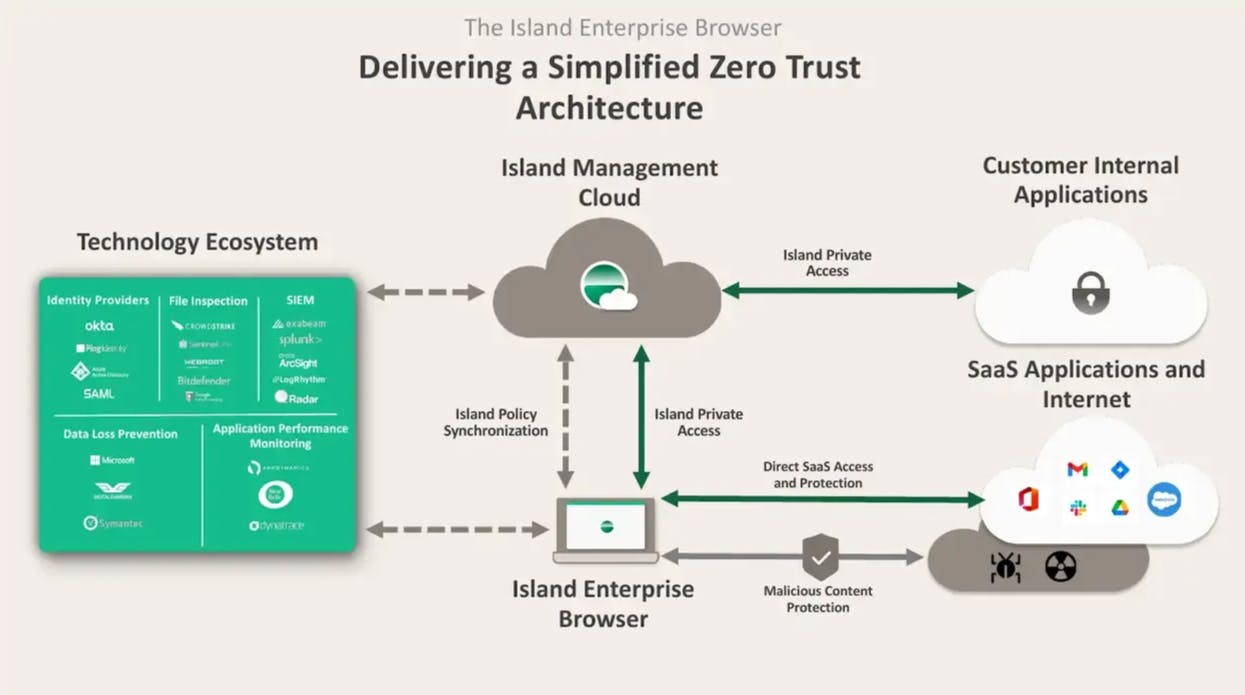
Source: Business Insider
The Island Enterprise Browser is designed to embed enterprise security directly at the browser layer. It connects through the Island Management Cloud, where administrators synchronize policies and enforce zero-trust access to both internal applications and SaaS tools. The browser integrates with identity providers, data loss prevention systems, file inspection tools, SIEM platforms, and performance monitoring services, allowing organizations to manage access and protect data without relying on separate endpoint agents or proxies. Core functions include secure private access to enterprise and cloud applications, malicious content protection, and real-time visibility into user activity, enabling organizations to combine secure access, compliance, and performance monitoring in a single browser environment.
Island Enterprise Browser
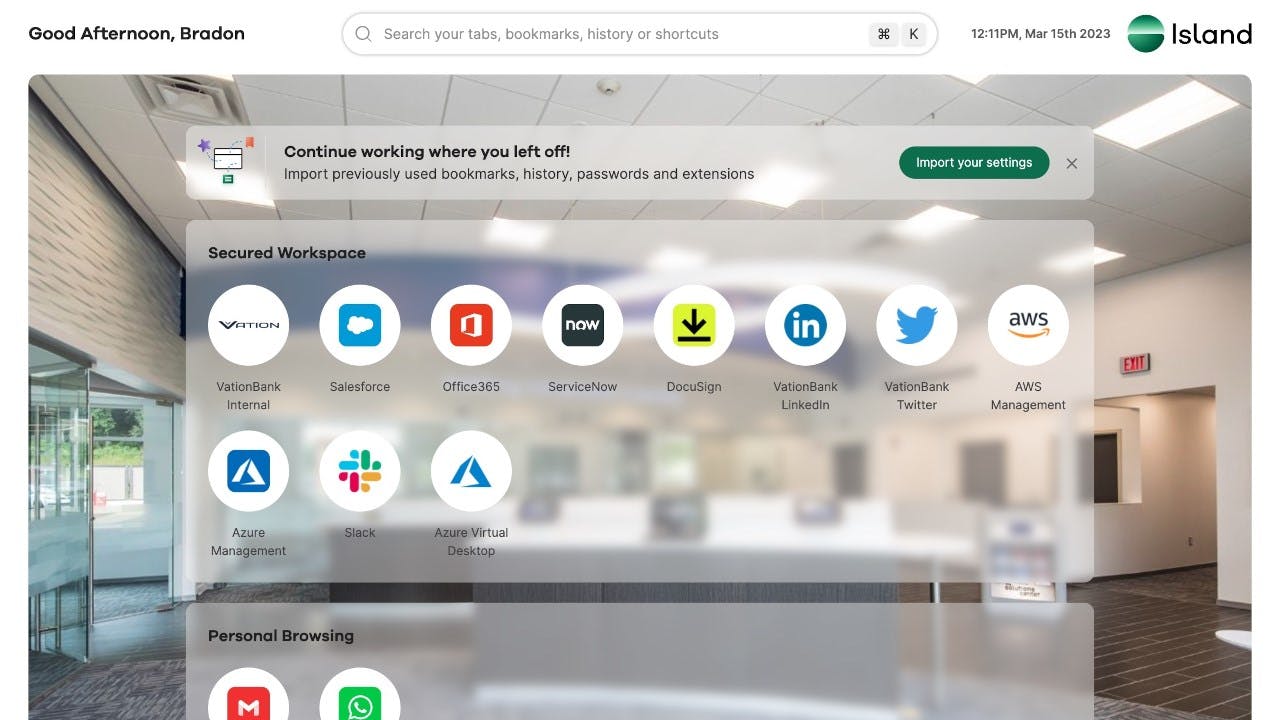
Source: Island
The Island Enterprise Browser is a Chromium-based browser built for enterprise use, installed directly on Windows, Mac, Linux, and mobile devices. It offers a Chrome-like user experience, including extension support, while enabling companies to enforce granular security policies at the browser level. Features include in-browser controls that block actions like copy/paste, downloads, and screenshots within specific web applications; zero-trust access based on user and device context; integrated watermarking and redaction of sensitive content; full session logging; and built-in web filtering to block risky or malicious sites.
Unlike traditional browsers that rely on third-party tools for data protection, Island embeds security controls natively, which, according to the company, reduces the need for endpoint agents, proxies, or data loss prevention (DLP) plugins. It also avoids the performance tradeoffs of VDI or RBI solutions. Island is used to secure SaaS access on unmanaged devices, enable BYOD programs without data leakage, and enforce compliance in regulated environments.
Island Management Cloud
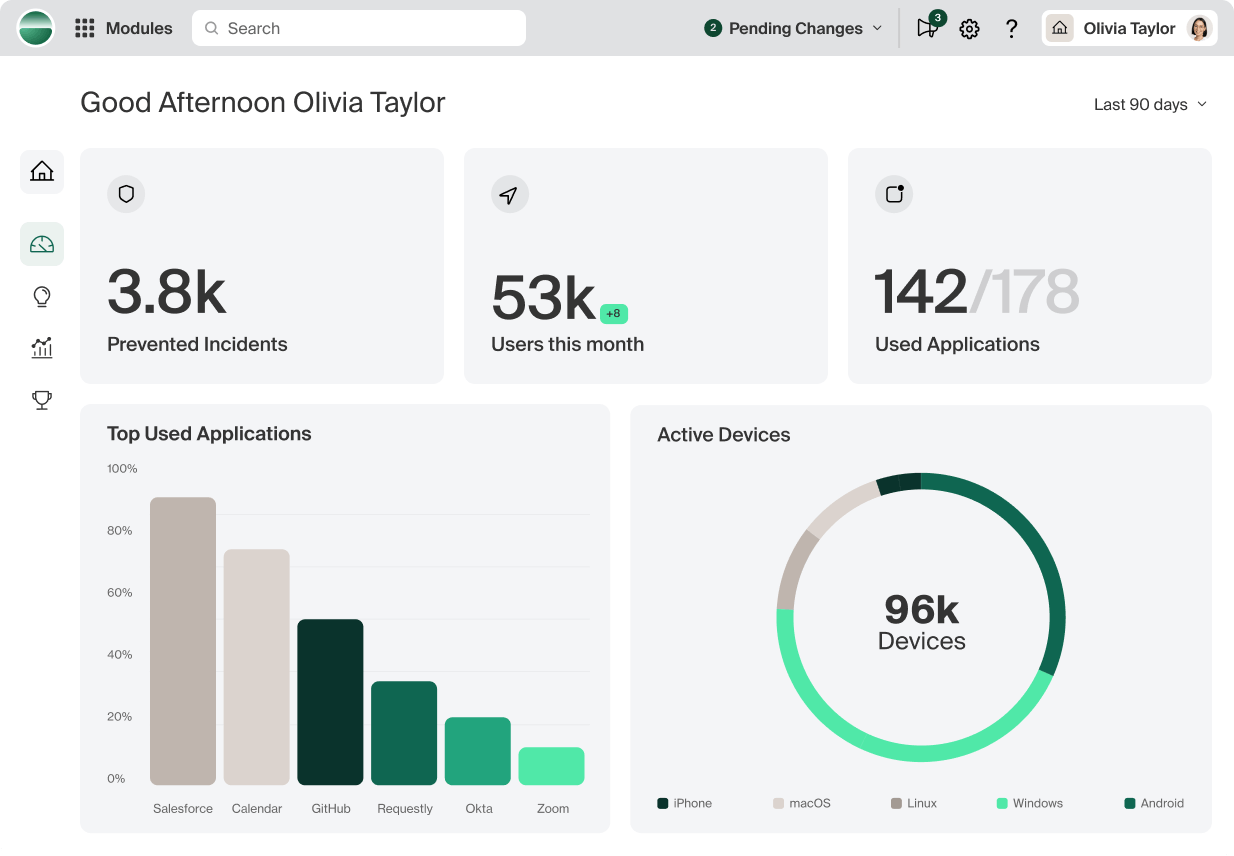
Source: Island
The Island Management Cloud is a centralized, cloud-based console that enables IT and security teams to configure and enforce browser-level security policies and DLP settings across users and devices. Unlike traditional solutions with static configurations, Island’s policies can be adjusted dynamically based on user identity, device posture, location, network, and application context.
Administrators can define and apply granular usage rules that govern what users can do within the browser, such as blocking copy-paste actions, restricting access to specific websites or tools, or controlling which extensions are allowed. The console provides real-time visibility into browser activity and generates historical usage reports to support audits and ensure compliance with internal policies and regulatory requirements. User behavior, including navigation and interactions, can be logged and reviewed, with optional screenshot capture to support post-incident investigations or security reviews.

Source: Island
Island also integrates with existing IT and security infrastructure, which allows data to flow into the organization’s broader monitoring and response systems. In 2023, Island introduced a Digital Employee Experience module that gives administrators insight into application performance and user engagement within the browser. The dashboard tracks metrics like web application load times, error rates, and usage patterns. This helps IT teams identify performance issues and optimize the end-user experience.
Generative AI DLP
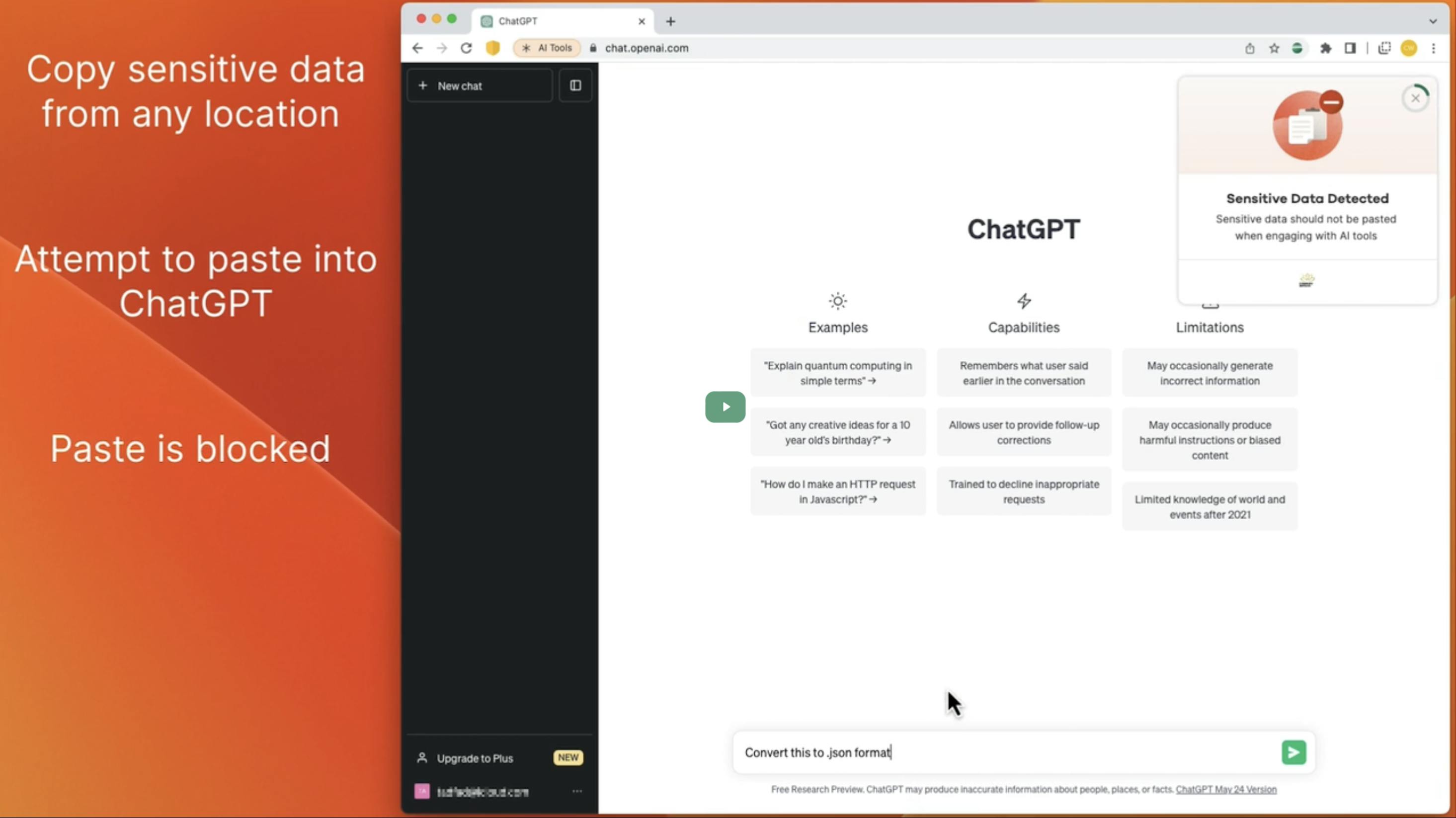
Source: Island
Island launched its enterprise-grade DLP feature for generative AI tools in June 2023. The solution detects and blocks sensitive data from being entered into AI platforms like ChatGPT and Gemini, helping prevent leaks via AI use at work. The system also scans AI-generated output, such as code for risky outputs, and displays in-browser prompts to inform users when their AI interactions violate company data policies. It operates in two modes: integrated into the Island browser itself or as a standalone desktop app.
Market
Customer
Island targets mid-to-large, security-conscious, cloud-first enterprises in highly regulated or IP-sensitive sectors, primarily banking, financial services, insurance (BFSI), healthcare, IT services, and government. These organizations often manage large distributed teams and rely heavily on SaaS platforms. BFSI remains the largest enterprise browser end-user segment.
Island’s architecture integrates with existing identity systems (e.g., Okta, Azure AD) and avoids major infrastructure changes. However, adoption still requires validating a new security paradigm, and sales cycles likely involve technical proof-of-concept phases and executive buy-in.
In adopting Island, customers have replaced legacy VDI setups to cut infrastructure costs and improve efficiency: one global bank decommissioned 400 servers and saved tens of millions in infrastructure costs, a pharmaceutical firm reduced contractor VDI costs by 94%, and a national retailer sped up point-of-sale system launch times by 80%. Publicly-named clients of Island include Fiverr, Swiss Life, The Bank of Marion, and ED&F Man.
Market Size
The enterprise browser market was valued at $3.1 billion in 2024 and is projected to grow at a CAGR of 19.6%, reaching approximately $13.8 billion by 2033. A closely related category, the browser isolation market, was valued at $1.2 billion in 2025 and is expected to reach $2.6 billion by 2030, growing at a 17.4% CAGR. In one September 2024 report on the space, Gartner predicted that “by 2030, enterprise browsers will be the core platform for delivering workforce productivity and security software on managed and unmanaged devices for a seamless hybrid work experience.”
This market growth is largely driven by increased enterprise demand for secure browsing environments that minimize cyber risk, enable remote and cloud-based workflows, and help organizations comply with increasingly strict data protection regulations. Notably, cyberattacks involving stolen or compromised credentials rose by 71% YoY, with an estimated 2.2K attacks occurring daily. Global cybercrime damages are projected to reach $10.5 trillion annually by 2025.
Geographically, North America leads the enterprise browser market with 38% share ($1.18 billion), driven by early cloud adoption, cybersecurity maturity, and regulatory pressures (e.g., HIPAA, CCPA). Europe follows at 27% ($837 million), where demand is rising due to GDPR compliance requirements and growing cross-border collaboration. Asia Pacific, while smaller at 22% ($682 million), is the fastest-growing region (CAGR 23.1%) due to rapid digitalization. Island’s traction reflects these trends, with 87% of Island’s customers reportedly located in North America.
Competition
Competitive Landscape
Island operates in the enterprise browser market alongside startups like Talon Cyber Security and Seraphic Security, as well as incumbents like Google Chrome Enterprise and Microsoft Edge for Business. While legacy tools such as VPNs, RBI, DLP suites, and VDI from vendors like Citrix remain in use, enterprise browsers offer a more unified and flexible approach to secure browsing and are increasingly being adopted as alternatives or complements.
As of 2025, Chrome Enterprise, Island, and Microsoft Edge for Business are recognized as the top three players in the enterprise browser space, with Chrome leading in market share. In contrast, the market was much more fragmented in 2023, with the top eight market participants accounting for 69.2% of total market revenue. Island had led the market that year with a 17.8% share. Among Island customers, 27% also considered Microsoft, 20% considered Citrix, and 14% considered Google.
Island’s early positioning was driven by aggressive marketing campaigns that helped define and promote the enterprise browser category. On the product side, it distinguished itself through unique containerization technology that isolates browser activity from the host operating system, reducing the risk of malware propagation.
Competitors
Venture-Backed Private Competitors
Talon Cyber Security: Founded in 2021, Talon Cyber Security is one of Island’s closest competitors in the enterprise browser space. Its flagship product, the Talon Enterprise Browser, is Chromium-based and designed to give enterprises enhanced visibility, fine-grained policy enforcement, and secure access to SaaS and web applications. As of August 2025, Talon had raised $143 million across three funding rounds from investors including Lightspeed Venture Partners, Team8, and Evolution Equity Partners, the latter of which led Talon’s $100 million Series A in August 2022. In November 2023, the company was acquired by Palo Alto Networks for $625 million. While both Talon and Island offer similar core features, their strategic focus differs: Talon primarily targets unmanaged devices used by contractors and remote workers as a lightweight alternative to VDI, whereas Island positions its browser as a full-scale replacement for traditional browsers across all users in an organization.
Seraphic Security: Founded in December 2019, Seraphic Security transforms any mainstream browser, including Chrome, Safari, Edge, Firefox, and even Electron-based apps like Teams and Slack, into a secure enterprise browser. It does so by injecting a lightweight agent that randomizes the browser’s execution environment; this helps to prevent zero-day exploits while enabling real-time data loss prevention and governance controls. Unlike Island, which seeks to replace standard browsers entirely, Seraphic Security’s solution allows organizations to continue using their existing browsers, though with less granular control. As of August 2025, Seraphic Security had raised $29 million through its Series A in January 2025, led by GreatPoint Ventures, with participation from Cota Capital, Storm Ventures, Eastlink Capital, and Planven Entrepreneur Ventures.
Incumbent Public Competitors
Google Chrome Enterprise: Alphabet, founded in 1998, is the parent company of Google and a global leader in internet services, advertising, cloud computing, and enterprise software. Google Chrome Enterprise, the business-focused version of the Google Chrome browser, provides organizations with administrative controls, extension management, and integration with Google Workspace and ChromeOS. As of 2025, Google Chrome Enterprise is the most widely adopted enterprise browser, used by “millions of enterprise users” worldwide. Security features like data loss prevention and threat protection are available through a Premium add-on and rely on cloud-managed connectors.
Microsoft Edge for Business: Microsoft, founded in 1975, is a global technology company known for its operating systems, productivity software, and enterprise tools. Microsoft Edge for Business is a version of Microsoft’s Edge browser designed for organizational use. It is often used in Microsoft-dominant IT environments due to native compatibility with Microsoft’s suite of threat protection products like Defender, Intune, and Purview. In March 2025, Microsoft announced advanced data protection features around Edge for Business, aimed at securing BYOD usage and generative AI tools by adding context-aware DLP, auditing, and policy controls directly within the browser.
Business Model
Island reportedly generates revenue primarily through its flagship Enterprise Browser, which accounts for roughly 70% of total revenue. The remainder comes from its newer generative AI DLP solution (20%) and ancillary services such as integration and training (10%).
The company uses a per-user enterprise licensing model, typically negotiated through custom quotes that reflect company size, deployment preferences, and required features. Publicly available pricing on platforms such as Microsoft Azure indicates a $250K\ annual fee for access to the Island Management Console. Similarly, procurement frameworks like the UK Government’s G-Cloud list a $250K annual flat fee per organization for management console access, in addition to $200 per user annually for browser usage. Each license covers multiple devices per user.
After raising $250 million in March 2025, Island specifically earmarked the funding for “development and hiring”. As of August 2025, the company employed approximately 500 people, over 200 of whom work in engineering and product development. This suggests a cost structure dominated by technical salaries and ongoing investment in software innovation.
Island operates with an asset-light structure. Its software is Chromium-based and installs directly onto user devices, without requiring proprietary hardware or physical infrastructure. The management console is hosted on third-party cloud platforms such as AWS and Azure. Island’s architecture allows security tasks to be executed locally, which reduces both infrastructure burden and bandwidth consumption. This contrasts with security providers like Zscaler, which rely on routing traffic through proprietary cloud nodes.
Traction
In March 2025, Island reported that its annual recurring revenue had more than doubled each year following its emergence from stealth in February 2022. However, unverified external estimates suggest growth potentially moderated in 2024, with ARR increasing from $75.9 million in 2023 to $87 million in 2024, a 14.7% YoY increase. As of 2025, Island holds an estimated 15% share of the secure enterprise browser market.
Island primarily targets mid-to-large enterprises. The company serves approximately 450 business customers across the financial services, education, manufacturing, and retail sectors. Notable clients include Fortune 100 firms, a global airline, a leading bank with over $2 trillion in assets, and a top-five hotel group. In one case, a Fortune 100 financial services firm replaced its legacy VDI solution with Island, resulting in a reported 40% reduction in security incidents and improved user experience.
Island was named the 2023 Gartner Peer Insights Customers’ Choice for Security Service Edge, with 100% of reviewers recommending the product. Buyers rated Island 5.2% above the market average on functionality and performance, and 4–5% higher on customer-centricity and long-term vision. Scores for “user community” and “pre-existing relationships”, however, lag below market averages. Island was named Best Enterprise Security Solution of 2022 by SC Magazine and listed on the 2024 Forbes Cloud 100.
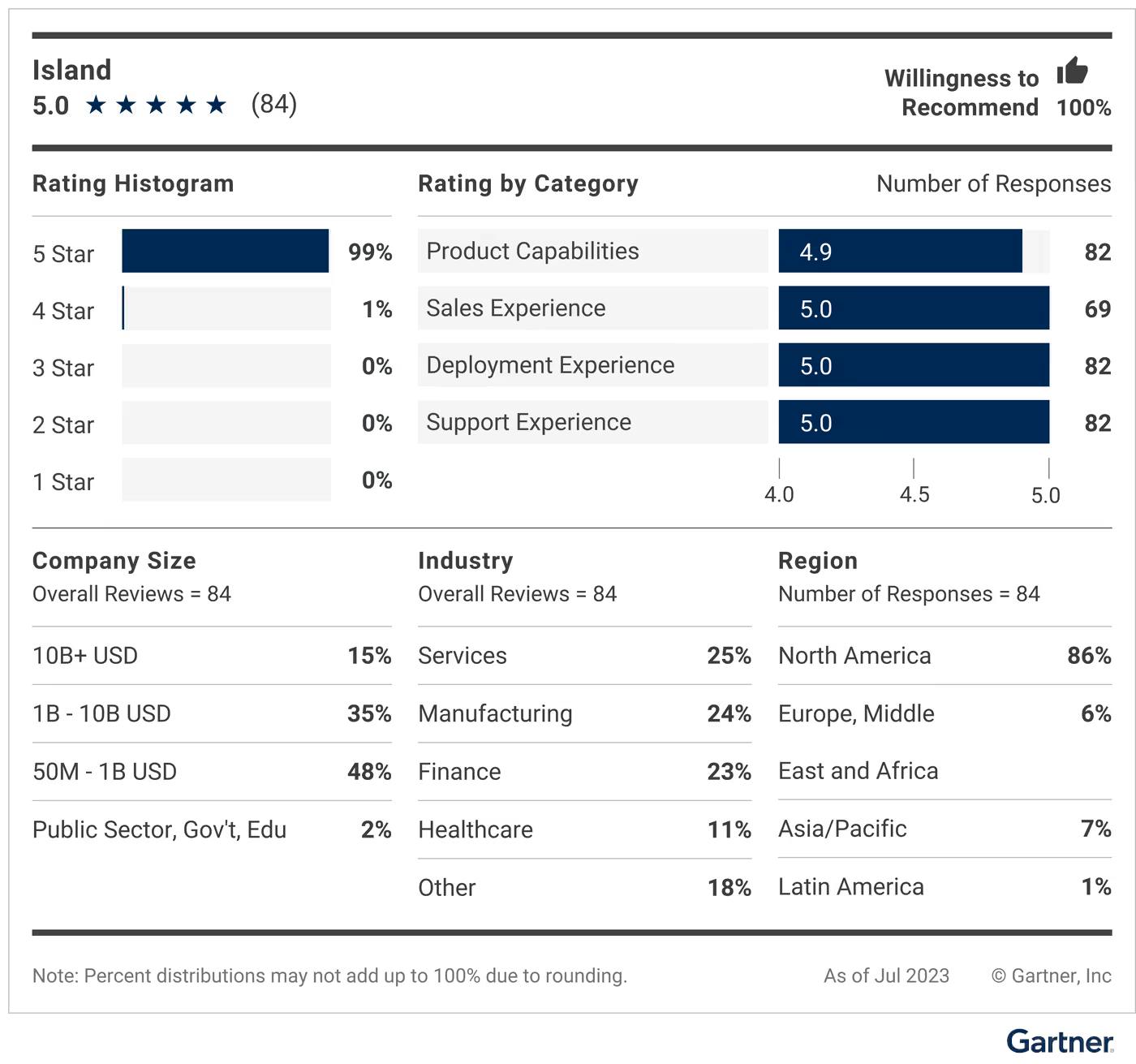
Source: Island
Valuation
Island raised a $250 million Series E round in March 2025, led by Coatue at a $4.8 billion valuation. As of August 2025, the company had raised cumulative funding of $810 million across nine rounds. Notable previous investors include Sequoia Capital (led Seed in 2020 and co-led Series D in 2024), Insight Partners (led Series A and B in 2022), as well as Cisco Investments, Canapi Ventures, Georgian, Prysm Capital, and EDBI. Island raised four rounds in a 10-month period in 2022, including a $100 million Series A in February, $115 million Series B in March, a $10 million top-up in July, and a $60 million extension in November.
Comparable public cybersecurity peers, including Zscaler (15.5x EV/Sales), Cloudflare (24.7x), and CrowdStrike (29.7x), trade at a range of revenue multiples from 15.5x to 29.7x. At comparable multiples, Island would need to generate $160 million to $310 million of revenue. Any premium to that may suggest that investors are pricing in a premium for Island’s perceived category creation in the enterprise browser space.
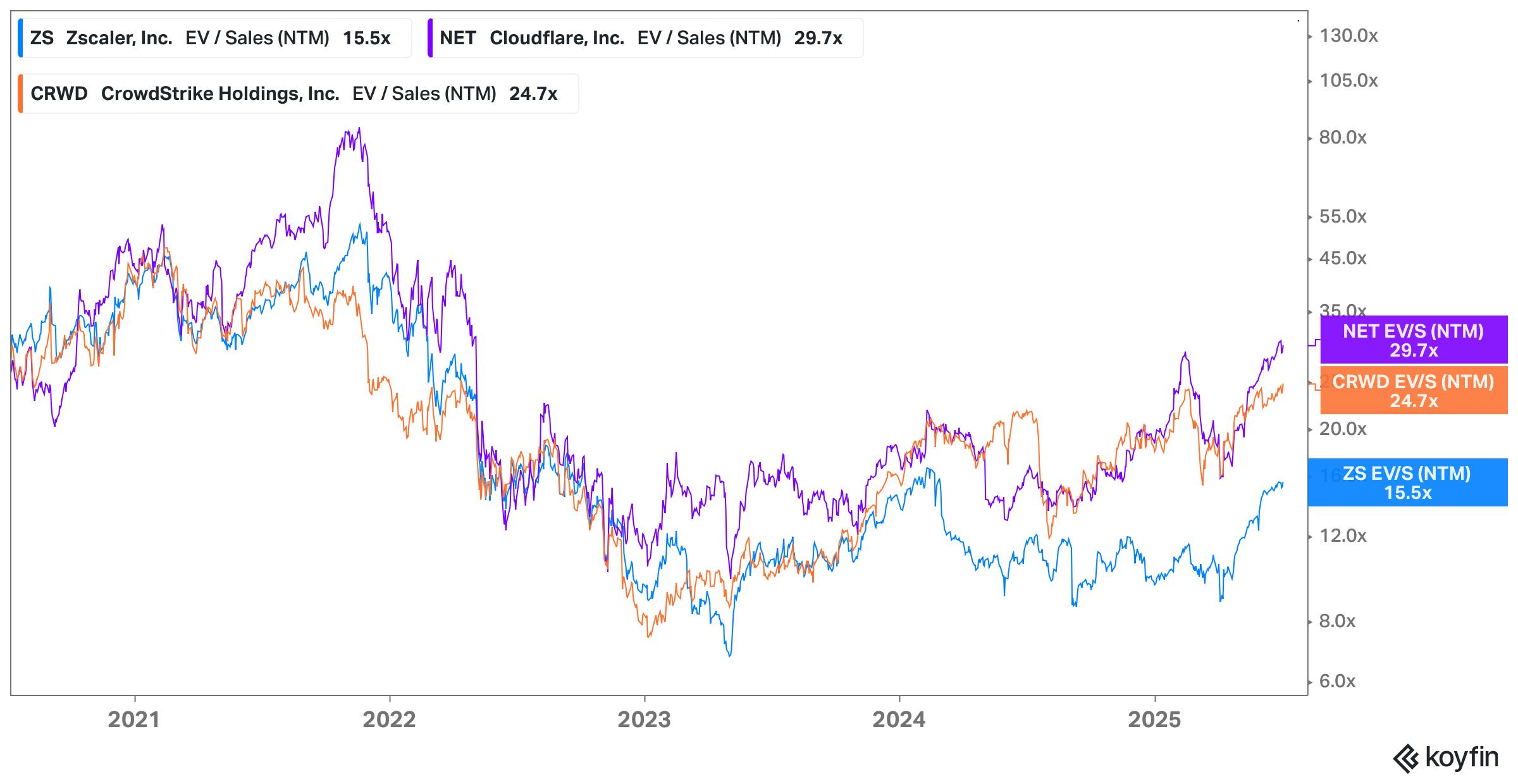
Source: Koyfin
While these public companies faced sharp valuation corrections during the 2022 SaaS crash, Island’s private valuations rose steadily, from $1.3 billion in 2022 to $4.8 billion in 2025, and its valuation trajectory appears more tightly coupled to revenue growth.
Key Opportunities
Fragmentation of the Secure Access Stack
Enterprises increasingly rely on a fragmented mix of secure access tools, including VPNs, VDI, RBI, and DLP systems, to manage security and user access. This patchwork approach often leads to high operational costs, inconsistent user experiences, and gaps in security coverage. As of 2025, 64% of UK organizations cited tech complexity and lack of interoperability as major barriers to strong security implementation, while 92% have made simplifying their tech stacks a top priority for 2025. An excess of security vendors and tools was the second most commonly reported obstacle to effective cybersecurity, cited by 35% of organizations. Island addresses this demand by combining access control, DLP, session recording, and web filtering within one platform.
Regulatory Pressure
In June 2024, the SEC amended Regulation S-P to require US broker-dealers, investment companies, and investment advisers to implement written policies for detecting, responding to, and recovering from unauthorized access to customer data. Since 2018, the EU’s General Data Protection Regulation (GDPR) mandates that organizations implement “appropriate technical and organisational measures” to secure personal data, such as access controls, data minimization, and activity logging. As regulatory demands for stronger breach preparedness and data governance intensify, companies may adopt Island to meet the audit and compliance requirements that traditional browsers cannot support.
Agentic Browsers
Agentic browser technology, where AI agents autonomously perform multi-step tasks within the browser, could present a potential growth area for Island as enterprises seek to balance productivity gains with security requirements. As AI-powered assistants become embedded in everyday workflows, organizations face new risks of sensitive data being shared with or generated by autonomous agents operating across web applications. Island’s architecture, which enforces policy controls directly at the browser layer and integrates with DLP, identity, and monitoring systems, is well-positioned to extend these protections to agentic browsing environments. By embedding guardrails such as real-time policy enforcement, visibility into AI-driven sessions, and restrictions on data movement, Island could provide enterprises with a secure framework for adopting agentic browser capabilities while maintaining compliance and minimizing exposure to AI-related threats.
Key Risks
Competitive Pressure
Island competes with major incumbents like Google (Chrome Enterprise) and Microsoft (Edge for Business). These larger firms benefit from pre-existing integration within enterprise IT environments, greater resources, established reputations, and global reach. As of 2025, Google leads the enterprise browser market. One key advantage for these incumbents is security performance. Reports from security vendors show that Chrome consistently delivers faster responses to security threats than other browsers. In contrast, commercial Chromium-based alternatives like Opera, Brave, and Vivaldi have shown delays of 2 to 10 days in patching zero-day and one-day vulnerabilities.
Adoption & Deployment Friction
Adoption of enterprise browsers may be slow, with forecasts projecting only 25% by 2028. Many clients are resistant to switching from mainstream browsers due to compatibility issues with legacy systems. 43% of Fortune 500 firms, for instance, have delayed browser security upgrades because older internal platforms are incompatible with modern browsers. Applications built for Internet Explorer 11 often lack support for current authentication standards, and updating them to meet these requirements can be costly. Over half of organizations studied had to roll out enterprise browsers in stages due to technical or user resistance, and 31% run multiple browsers in parallel to preserve legacy support.
Summary
The browser has become the central interface for enterprise work, with employees spending over 70% of their day in browsers or virtual meetings. Traditional solutions, however, have not kept pace with enterprise needs in security, policy enforcement, and data governance. Legacy tools like VDI and RBI were developed to secure remote access but are increasingly viewed as too expensive or inflexible for modern SaaS and hybrid environments. Meanwhile, browser-based attacks are rising rapidly, with phishing incidents increasing 140% between 2023 and 2025, and one in five attacks now using evasive techniques to bypass endpoint defenses.
Island operates within the emerging enterprise browser category, offering a Chromium-based browser that allows IT and security teams to directly control data movement, user behavior, and application access. Rather than serving as an overlay or extension, Island replaces the traditional browser entirely, giving it deeper access control and visibility over enterprise activity. As of July 2025, the company serves ~450 enterprise customers, including Fortune 100 firms and global banks, and has raised $810 million in total funding, most recently at a reported valuation of $4.8 billion.
The company may benefit from multiple tailwinds: increased regulatory pressure for auditable user access, the proliferation of bring-your-own-device and contract-based workforces, and growing demand for security stack consolidation. Looking ahead, Island’s ability to maintain growth will depend on its ability to overcome deployment friction and compete with incumbent vendors like Google and Microsoft, which are integrating enterprise security into their browsers at scale.




